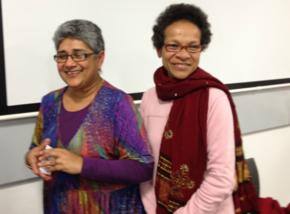Fiji issues aired in panel discussion

A prominent Fiji women’s rights activist was in New Zealand recently to voice concerns on events in Fiji ahead of this month’s general election.
Shamima Ali, head of the Fiji Women’s Crisis Centre, along with Dia Uluiviti, lawyer and active member of Democracy for Fiji Movement, addressed attendees at a panel discussion at the Auckland University of Technology last week. Ms Ali is also chair of Fiji NGO Coalition of Human Rights.
Ms Ali highlighted cases of intimidation of journalists, media censorship, and police brutality following which one man had died and an investigation was underway.
“New Zealand should continue to talk about governance issues and also human rights issues,” Ms Ali said in response to what New Zealand could do in post-election Fiji.
Ms Uluiviti also talked about the political system and processes in Fiji since its independence from Fiji in 1970.
One interesting factor in this month’s election would be the ballot paper – which does not carry any name or party symbols of the candidate. The ballot paper this time identifies each candidate only by a number.
In order to vote for the candidate of your choice, you should know his number.
Fiji goes to the polls for the first time in eight years since Navy chief Commodore Frank Bainimarama removed the elected government of Laisenia Qarase from power and ruled since then by decree.
A prominent Fiji women’s rights activist was in New Zealand recently to voice concerns on events in Fiji ahead of this month’s general election.
Shamima Ali, head of the Fiji Women’s Crisis Centre, along with Dia Uluiviti, lawyer and active member of Democracy for Fiji Movement, addressed...
A prominent Fiji women’s rights activist was in New Zealand recently to voice concerns on events in Fiji ahead of this month’s general election.
Shamima Ali, head of the Fiji Women’s Crisis Centre, along with Dia Uluiviti, lawyer and active member of Democracy for Fiji Movement, addressed attendees at a panel discussion at the Auckland University of Technology last week. Ms Ali is also chair of Fiji NGO Coalition of Human Rights.
Ms Ali highlighted cases of intimidation of journalists, media censorship, and police brutality following which one man had died and an investigation was underway.
“New Zealand should continue to talk about governance issues and also human rights issues,” Ms Ali said in response to what New Zealand could do in post-election Fiji.
Ms Uluiviti also talked about the political system and processes in Fiji since its independence from Fiji in 1970.
One interesting factor in this month’s election would be the ballot paper – which does not carry any name or party symbols of the candidate. The ballot paper this time identifies each candidate only by a number.
In order to vote for the candidate of your choice, you should know his number.
Fiji goes to the polls for the first time in eight years since Navy chief Commodore Frank Bainimarama removed the elected government of Laisenia Qarase from power and ruled since then by decree.









Leave a Comment